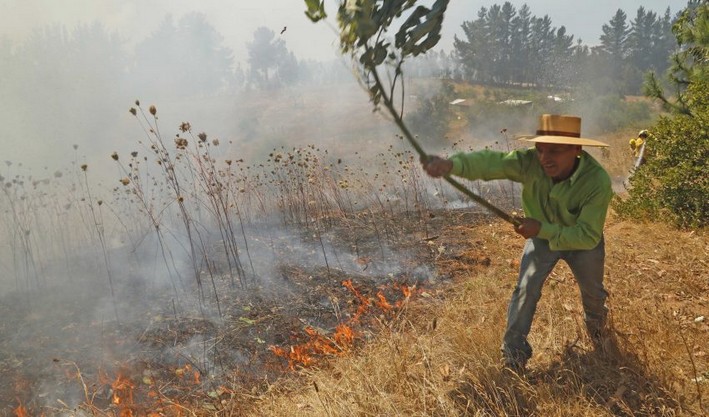Green Party deputy Félix González warned that the delay may be due to interference from the Ministry of Agriculture to favor the processing of the government's bill. The ministry stated nationwide that Congress has the authority to advance other initiatives that help prevent disasters.
As summer and high temperatures approach, the likelihood of wildfires increases—a situation that, according to local deputies, makes it urgent to accelerate the processing and approval of the Short Fire Law. The legislative bill, which aims to grant municipalities, together with CONAF, the authority to create firebreaks, limit forestry plantations, and separate them from populated areas—while also banning forestry plantations within urban radii—was approved on March 6 in the Lower House but remains under Senate review.
According to Green Party deputy Félix González, speeding up and approving the bill is vital, as hundreds of people are at risk with the imminent wildfire season, which in 2023 devastated over 200,000 hectares in the region and claimed 26 lives.
The lawmaker directly blamed Agriculture Minister Esteban Valenzuela for obstructing the initiative, stating, "He wants to pass the so-called Long Fire Law. We agree with its content, but we don’t see why that should halt the Short Fire Law, which empowers municipalities, alongside CONAF, to enter private properties and create firebreaks year-round. In Valparaíso, the only area spared during the fires was Villa Botania—it survived because it had firebreaks."
González stressed that regardless of the fire's origin—whether criminal, as in Valparaíso, or due to negligence, as in Nacimiento, Santa Juana, and Coronel—its spread must be combated with practical measures like firebreaks.
"CONAF is ready, with the personnel and machinery to create firebreaks, but it can’t enter properties without owners' consent. Now we’ll face another fire season without the Short Fire Law being approved, which I consider a major irresponsibility by the Senate and the Ministry of Agriculture," he asserted.
Advancing Other Initiatives
The Ministry of Agriculture stated that in late 2023, the government submitted a bill to regulate wildfire prevention, already approved by the Lower House—including Deputy González’s support—and now making substantial progress in the Senate.
"It is expected to pass Congress by year-end. The bill is under urgent status, with article-by-article voting set to begin soon. This initiative seeks to equip the future National Forestry Service with tools for wildfire prevention and mitigation in rural-urban interface and buffer zones. Given the devastation caused by fires, the President has prioritized this bill," they affirmed.
The ministry did not directly address González’s remarks but noted that Congress has the authority to advance other fire-prevention initiatives, adding that the ministry remains open to dialogue.
"Beyond a bill’s authorship, what matters is finding the most effective tools to prevent disasters—which the ministry believes are included in its proposed bill," they added.
Clarifying Intentions
UDI Senator Enrique van Rysselberghe stated that the Short Fire Law is already in its second constitutional review. "The delay stems from the Executive repeatedly requesting extensions due to indecision, the latest being on October 28 for two more weeks."
He explained that a technical committee has been working alongside the commission, refining recommendations still under wording adjustments.
However, he added, if the Agriculture Ministry intends to discard the Short Fire Law and replace it with another initiative, the government should clarify this before further discussion.
"Personally, I believe this bill—or any initiative on this issue—must include preventive patrols reinforced by our Armed and Security Forces. Last season, this approach proved highly effective in wildfire prevention, even without full national defense support."
High Risk
DC Deputy Eric Aedo called the delay in approving the Short Fire Law concerning, as the region faces both an impending fire season and tall grasslands in wooded areas due to heavy rains—factors that could worsen fires.
"I hope this bill moves swiftly. Senators on the Agriculture Committee must prioritize it," he said.
He added that any current amendments likely relate to property rights in fire-affected areas, limiting regulatory plan changes, or reclassifying rural zones near cities as urban.
Progress Being Made
PS Senator Gastón Saavedra affirmed that the bill is under review in the Senate Agriculture Committee. "Processing isn’t stalled, and no one claimed the Lower House’s approval was final. Corrections and consensus are needed, especially with the upcoming Long Fire Law—a comprehensive, permanent framework for disaster risk management."
He urged calm, hoping that by summer, Chile will have both the law and institutional readiness. "I’d ensure regional delegations and municipalities have full-fledged disaster risk plans to act effectively during emergencies like those we’ve faced."
Regarding alleged ministerial interference, Saavedra dismissed the claim as contradictory, noting the ministry supports the Long Fire Law for greater stability in disaster management.
"I wouldn’t be so categorical. There’s an ongoing legislative process, and deputies must oversee that regional and municipal disaster plans are in place to protect the public."
For now, he said, SENAPRED, CONAF, and all public institutions must focus on disaster readiness to ensure public safety during fires.
Source:Diario Concepción







Comentarios (0)
No hay comentarios aún. ¡Sé el primero en comentar!
Deja un comentario